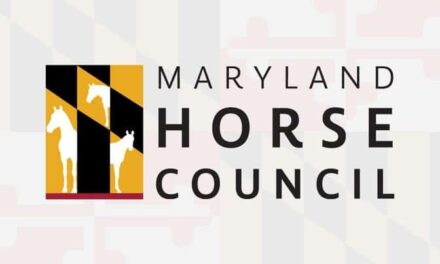It is over, dear readers, it is over. The 2011 session of the Maryland General Assembly has adjourned, and what is done is done.
As usual, it was a 90-day frenzied mosh pit of legislative initiatives and counter-initiatives, posturing and capitulating, deals and compromises
What didn’t get done will have to wait until 2012, as our elected officials return to their “real lives” to try to earn a living for the rest of 2011. At least, that is the theory.
Below are updates on some of the legislation The Equiery followed for 2011. If we wrote about a bill earlier (either in the print edition or on equiery.com/blog), but did not mention it in this wrap-up, it is safe to say the bill died.
However, there is one initiative we have not yet covered, and that is what happened to the funding for Program Open Space. Program Open Space, which is funded by transfer taxes on real estate, was on the chopping block in the massive budget bill. The bill passed, with enough amendments to keep an army of lawyers employed for the rest of the year analyzing them. We are not yet sure how the budget bill impacted Program Open Space and the various offshoot programs that trickle down to affect the equestrian community, but we hope to provide an analysis in an upcoming issue or on equiery.com/blog.
If you have comments or thoughts about these or other pieces of legislation, please e-mail editor@equiery.com or use the comment box below.
Renewed Funding for Racetrack Revival
To say that Maryland legislators passed the racetrack renewal funds bill at the 11th hour is no mere cliché. The 2011 Maryland General Assembly was scheduled to adjourn for the year at midnight on Monday April 11, and at about 11:40 p.m. that night, the legislators passed House Bill 1039.
As we have reported in the earlier print editions of The Equiery and on equiery.com, the bill redirects to operating costs some of the slots funding originally earmarked for capital improvements. It takes no money out of general funds.
The bill was initiated by the Governor’s office as a bridge mechanism to get the tracks to sustainability now that slots revenue is actually flowing. The Governor’s bill required the tracks to open their books to the public and to put forth a sustainable business plan before the funds would be authorized.
But the Governor’s version did not pass unscathed. Proposed amendments abounded, and many stuck. For instance, while the Maryland Jockey Club (owners of Pimlico, Laurel and Bowie) would be eligible for up to $6 million for operating costs in 2012 and 2013, Rosecroft Raceway and Ocean Downs will only be eligible for $1.2 million each.
One of the most critical (and perhaps controversial) changes requires MJC and Rosecroft to reach a simulcast agreement before receiving state subsidies. Readers may recall the legal brouhaha when Cloverleaf Enterprises (the former owner of Rosecroft) refused to pay the $5.9 million they owed the Thoroughbred entities for the simulcasting broadcast rights of Thoroughbred races, and MJC retaliated by cutting Rosecroft’s feed of thoroughbred races shortly before the running of the Kentucky Derby in 2009. Well, if MJC and the new Rosecroft owners want their operating funds, they are going to have to find a way to play nice.
Speaking of the new Rosecroft owner…Equiery readers may recall that Penn National Gaming Inc., which owns 49% of MJC, recently acquired Rosecroft. Does that mean that Penn National needs to make a deal with itself? ApparentLy, our elected officials didn’t think too much of that idea and they amended the HB 1039 to require that Penn National recuse itself from being involved with the Thoroughbred side of the simulcasting negotiations if it has not yet sold its shares of MJC.
Amendments also include prohibitions against MJC using these funds to pay off legal or lobbying bills.
For more details, see The Daily Record.
Bowie Transfer Effort Survives??
In the May print edition, we printed that SB 491, which would have allowed the owner of the Bowie Race Course Training Center (that would be the Maryland Jockey Club) to convey the property associated with the Bowie Training Center to the State of Maryland, Prince George’s County, or the City of Bowie, didn’t pass, nor did its companion bill HB 557. However, according to the website “The Bowie Patch,” the effort DID pass. We hear that it ended up in the overall budget bill, but we don’t yet have confirmation on that.
Sunday Hunting
The only Sunday Hunting bill that looks like it made it through the 2011 session is Senate Bill 468, which will allow Sunday hunting on private land in Carroll County.
Rural Legacy Threat
Equestrians in Baltimore County oppose the establishment of a power station in their Rural Legacy area, and thus were very active trying to pass House Bill 1241, which would prohibit construction of a new shopping center, electric power station or substation, or other nonagricultural use in a Rural Legacy Area if the new use will exceed five acres. The bill died in committee. The Equiery received the following comment on this effort: “One problem with the state legislation approach to this is it might impact the construction of solar panel ‘farms’ (which would include a substation)…. I can appreciate the effort to use state legislation as a tool to stop this BGE project, but I’m not sure that is the best approach. I certainly wouldn’t employ it if I were mounting a battle to stop such a project or I would at least allow for things like windmill farms. Why can’t [the equestrians in Baltimore opposed to the BGE substation] amend Baltimore County zoning? Just a thought.”
Prohibiting Animal Cruelty Convicts from Animal Ownership
(what we like to call “The Michael Vick Law”)
House Bill 227, after passing unanimously out of the House on March 10, passed the Senate unanimously on March 31, and the Governor signed it into law on April 12. Isn’t that refreshingly reasonable, to not allow someone who has been convicted of animal cruelty to own another animal, no matter how famous they are?!
Violence or Cruelty towards Pets & Service Animals
On March 16, we reported that House Bill 407 appeared stalled, but on March 23, it roared back into life, passing the House 127–10, crossing over into the Senate and were it was passed unanimously on March 31, and it now awaits the Governor’s autograph.
No Hoof, No Horse: SB 32 Gallops Down The Stretch on Four Good Feet
The common-sense Senate Bill 32, which merely clarifies in the vet law that farriers can not only shoe (as the law currently states), but they can also legally trim without the oversight of a vet. Well, of course, we say, “no duh!” But apparently a very, very narrow reading of existing law prohibited trimming, so the law had to be fixed. The bill looked like it might fade in the stretch, but it galloped neatly under the wire and was signed into law by the Governor on April 12.
Allowing Vet Techs To Be Vet Techs
Another common-sense bill to clean up the language in the vet law, SB 322 passed out of the Senate on February 25 and then lingered on the backside and almost looked like it would be out of the race for good, but it came from behind for a tight finish and was likewise signed into law on April 12.
Trailer Bill Stalled
SB 497, which would establish a new class of vehicles for livestock trailers weighing a max gross weight of 5,000 pounds and lower our registration fees, zoomed through the Senate, where it was passed unanimously just in time to cross the centerline into the House, where it was scheduled to be heard Tuesday, April 5, but apparently was bypassed, left on the shoulder.
Critical Farms Preservation Fund
House Bill 214 is being met with approval from both sides of the aisle, both sides of the House, as the bill was passed unanimously in both chambers.
****************
Do you miss the deadline for the May print edition? It is not too late to get your ad on equiery.com for May…contact Tracy today and ask her about “instant” online classifieds! 1-800-244-9580 or ads@equiery.com











